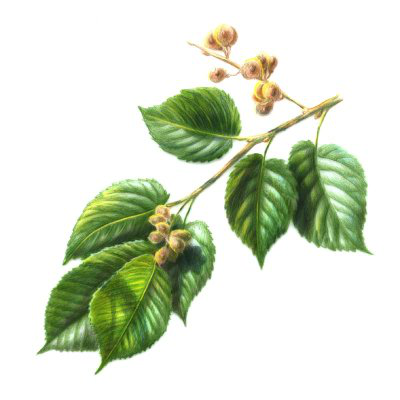Description
Botanical: Ulmus fulva (also known as Ulmus rubra)
Other common names: Indian Elm, Red Elm, Winged Elm, Rock Elm, Moose Elm, Sweet Elm,
American Elm
Slippery Elm Bark is soothing! As its name implies, this lubricating and nutritious herb coats irritated areas, allowing the body to heal itself. Its high level of mucilage helps to soothe a sore throat, ease indigestion and lubricate the bowel, which has made Slippery Elm Bark useful for easing Crohn's disease, colitis and irritable bowel disease (IBS).
Country of Origin: United States
Beneficial Uses:
The principal use of Slippery Elm Bark is to soothe sore throats. The high level of mucilage makes it extremely soothing for the inflamed mucous membranes of the throat and esophagus. Herbalists use it in cough medicines for scratchy, raw, sore throats and mouth irritations, and it is also an effective ingredient in throat lozenges.
Slippery Elm Bark helps to reduce inflammation of the intestinal tract. It soothes the inflamed mucous membranes of the bowel and neutralizes excess acids in the intestines, which make it beneficial for Crohn's disease, ulcerative colitis, diverticulosis, diverticulitis and irritable bowel syndrome. It has also been used to ease both constipation and chronic diarrhea.
One of Slippery Elm Bark's oldest uses has been as a digestive tonic. Again, its high mucilage content helps soothe inflamed mucous membranes of the stomach and neutralize excess stomach acids, making it an excellent remedy for the entire digestive system. It is said to soothe stomach irritation and the sore feeling that often follows vomiting. Old time herbalists use it as a remedy for ulcers and gastritis.
Slippery Elm Bark generally reduces inflammation and is useful for soothing the mucous membranes of the urinary tract and easing the inflammation of aching joints.
Midwives used Slippery Elm Bark as a mucilaginous herb to lubricate and ease childbirth.
Slippery Elm Bark works with the body to draw out impurities and toxins and has been a longtime treatment for cuts, bruises, wounds, burns and also to relieve inflamed or itchy skin.
Contraindications:
People with known allergies to elm bark should avoid Slippery Elm Bark. Other medications should be taken at a different time, because the herb's high mucilage content may interfere with their absorption.


